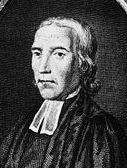
Daniel Rowland

Biography of Daniel Rowland (1713-1790)
Daniel Rowland was ordained a minister of the Anglican church in March 1734, but
like many other ministers both before and since, he did not know God.
Rowland became a curate in the church but instead of teaching the people the
word of God he preferred to take part in sporting activities.
It was not long after his ordination that he noticed that a number of his Sunday
morning congregation were in the habit of missing his sermons to go and hear the
local dissenting minister.
Eventually, Daniel Rowland started to go and listen to these dissenting
preachers to see what it was that attracted people to their preaching.
One day while listening to Griffith Jones of Llanddowror, Jones saw Rowland in
the congregation and stopped his sermon and prayed specifically for him. It was
with this prayer that Daniel Rowland felt the start of a work of God in his
soul.
After his conversion Daniel Rowland continued as a curate in Llangeitho in south
Wales but now he was preaching what he really believed, and people were coming
to a personal faith in Jesus Christ.
Up until this time Rowlands influence had been confined to his local area but
one day he was asked to preach in the village of Ystrad-ffin. He started
preaching there on a regular basis, and then he began preaching throughout south
Wales.
All of these activities did not escape the notice of the church of England
bishops and finally in 1763 the Bishop of St David's expelled Rowland from his
curacy. The reason for this expulsion was simply that he insisted on preaching
outside his designated parish. There were very few true Christian preachers in
that area and Rowland felt compelled to tell the gospel rather than leave them
in spiritual ignorance.
When Daniel Rowland was forced to leave the Church of England his congregation
left with him and built him a new chapel a short distance away. It was from this
chapel that Rowland was to pastor for the remaining years of his life, however
he continued to exercise an extensive ministry throughout South Wales. He was
also a fine Biblical theologian and was often resorted to to resolve questions
or disputes within the ranks of the Calvinistic methodists in Wales.
Rowland died in October 1790, and today his work is not widely known, especially
as his ministry was conducted entirely in Welsh and was therefore largely
inaccessible to English speakers.